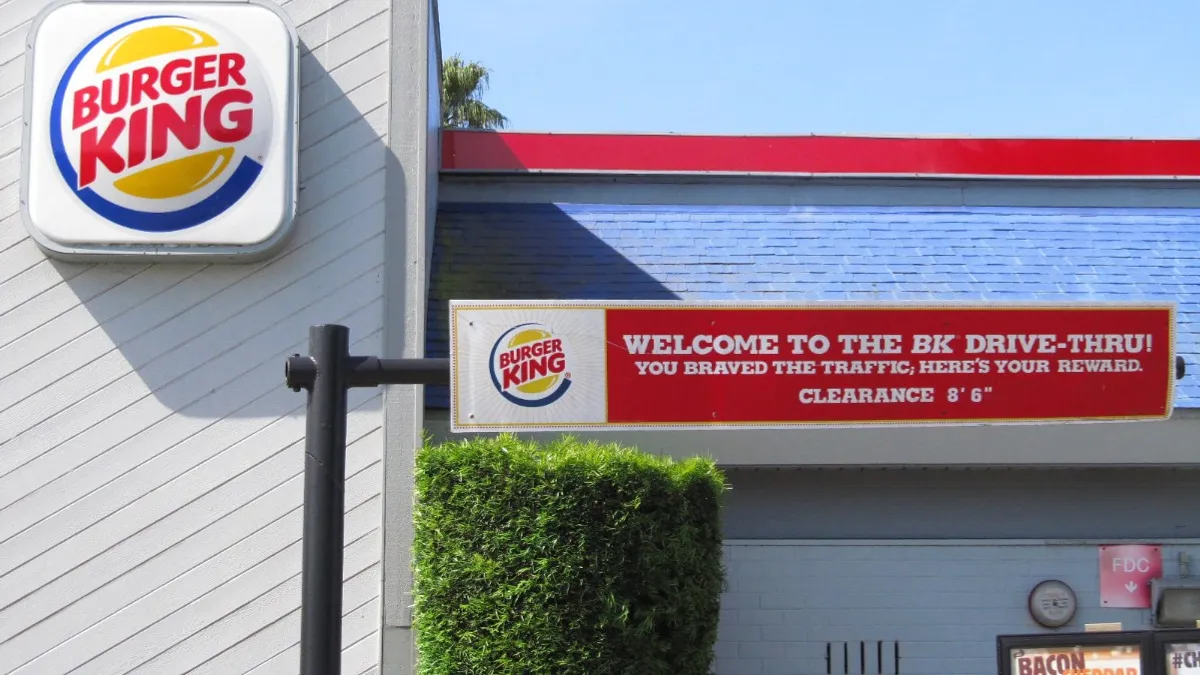Dive Brief:
- Restaurant Brands International will work to revolutionize the drive-thru experience at Burger King and Tim Hortons this year with an expedited rollout of digital menu boards at half of Burger King's U.S. locations and a majority of Tim Hortons stores in Canada, Joshua Kobza, Restaurant Brands International COO, said during an earnings call on Monday.
- The company is currently running tests with dynamic content that offers guests more location-based or situationally appropriate menu suggestions and personalized offers, he said.
- RBI is also working on deploying an intelligence platform behind each of its digital guest experiences, including mobile and online ordering, to capitalize on the tech infrastructure it has built over the last two years. The company has also developed customized and algorithm-based offers that will allow it to roll out personalized 1:1 marketing across all brands and touch points in 2020. This will be particularly emphasized at Tim Hortons, which is entering a second phase of its rewards program.
Dive Insight:
RBI has been playing catchup to key competitors over the last two years and has made significant progress on digital, delivery and personalization, which have become key areas of focus among top QSRs.
"It is our view that in order to be successful as our industry evolves, we must offer industry leading digital experiences integrated with our physical restaurants and technology in order to win with guests going forward," Kobza said.
With its top competitor McDonald's making huge investments in technology — it rolled out Dynamic Yield menu boards to over 9,500 drive-thrus last year, built a tech team and bought tech companies to gain an edge — RBI has to push forward with its own technology in order to keep pace.
The company has begun converting stores to the Burger King of Tomorrow design, which include self-order kiosks and other digital capabilities, but nowhere close to the pace of McDonald's store overhauls. In 2019, RBI rolled out over 800 Burger King of Tomorrow remodels, Restaurant Brand International CEO Jose Cil said during the earnings call.
Comparatively, McDonald's Experience of the Future remodels were rolled out to 2,000 units reaching 70% of its U.S. system in 2019. It’s now converted 10,000 units, and management expects the rollouts to reach just about every U.S. restaurant by the end of 2020.
While digital drive-thrus will be a big equalizer, especially with even more brands eyeing machine learning capabilities, RBI has already made headway in other key areas, including POS modernization. At Popeyes, the company went from about 40 different POS systems to two, which has made delivery and online ordering possible.
RBI also integrated delivery into the POS systems across all three of its brands, which led to improved in-store order fulfillment and helped accelerate growth, Kobza said. Over 4,200 Burger King restaurants now have delivery in the U.S. and over 9,000 globally, which represents a run-rate business of over $1 billion in sales on an annualized basis, he said. Popeyes delivery is available at over 1,600 restaurants in the U.S. Delivery for Popeyes U.S. represents about a $250 million business on an annualized basis, he said.
The company also has mobile apps, web ordering and white-label ordering capabilities across its three brands so that a customer can order directly from the brands and have delivery fulfilled by different third-party aggregator partners, he said.
Its work is starting to pay off, and digital makes up high-single digits as a percentage of total sales at Burger King and Popeyes, with digital representing over 10% of sales at Tim Hortons, he said.
"It is critical to establish our brands as leaders in their segments particularly with younger guests as we navigate the digital transformation of QSR," Kobza said.














